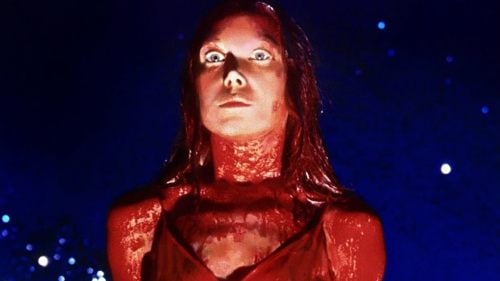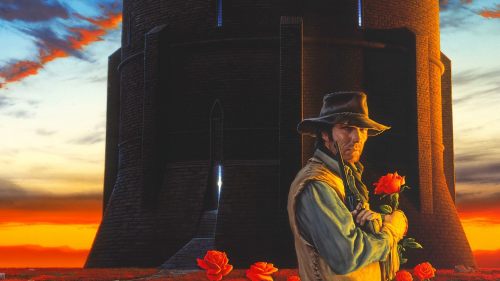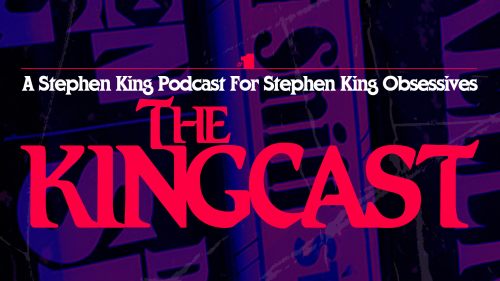What Beam Does THE DARK TOWER Take From Here?
During this writer’s screening of The Dark Tower, an inexorable sinking feeling set in from the moment we’re introduced to Jake Chambers (Tom Taylor) – the restless youth at the center of Stephen King’s Midworld-traversing filmic kick off. There’s a flatness to Jake’s New York City home, as if Rasmus Videbæk’s cinematography is somehow mirroring the crude drawings of the titular tower taped to the walls of the boy’s bedroom. Jake’s parents (Karl Thaning and Katheryn Winnick) appear like two upper middle-class WASP extras, plucked straight out of central casting, giving their lower form dreamer an assuring pep talk before sending him off to his latest therapy session, where he describes nightmarish reveries featuring a wandering, destructive Man in Black (Matthew McConaughey) that’ve been keeping him up at night. “This seems like the set up for a mildly watchable STARZ series,” my brain echoed, the sentiment bouncing off the walls of the abysmal quality abyss the picture slowly sank into before my eyes.
The relentless onslaught of negative criticism lobbed at The Dark Tower is already a thing of instant legend; a 19% furor so intense we’re already experiencing charitable appraisals from half-assed champions that don’t amount to much more than “it’s really not THAT bad, guys.” But it is that bad, if we’re being completely honest. Even if you deem the movie to be “mediocre”, “decent”, or “pretty good”, the fact that this is the most Sony could muster from what Stephen King personally deems his magnum opus is pretty depressing. McConaughey turns in a viable contender for the worst performance of his career, cooking chicken in a goofy apron before delivering howlers like “I see you are still resistant to my magicks!” with all the aplomb of a stoned Dungeon Master chewing the vinyl lining off a card table in your parents’ basement. Meanwhile, Idris Elba’s incredibly inspired casting as Roland Deschain, last gunslinger of Gilead, is utterly wasted, save for some goofy fish of water hijinks when Jake takes him to NYC, and a climactic action sequence that’s practically rendered incoherent via the picture’s chopped to hell editing schematic.
Nevertheless – following a reenactment of William Hurt’s “how do you fuck that up?” routine from A History of Violence in the theater parking lot after the credits rolled – my thoughts couldn’t help but return to the notion that I’d just watched nothing more than a big screen pilot, and how it might’ve been easier to be more forgiving had The Dark Tower aired on HBO, AMC, or Netflix; knowing it was merely set up for eleven more hours of exploration in this vast multiverse King literarily established (and director Nikolaj Arcel cinematically “remixed”). After all, very few of my favorite series were birthed fully formed and firing on all cylinders. Even small screen masterworks like Deadwood had to iron out narrative and pacing kinks before delivering some of the best television in the medium’s history.
As Scott’s spot on review notes: certain aspects of Arcel’s world-building are quite impressive, most notably Jake entering coordinates into a North Central Positronics control panel, and the opening sequence in Algul Siento. Even the jarringly nonsensical “control base” the Man in Black storms about, barking orders at subordinates (poor Jackie Earle Haley) like a second-rate Vader, could be cool if we were actually allowed to slow down and understand its workings for a second. Really, that’s the movie’s fatal flaw – it’s a Cliff’s Notes re-ordering of material that truncates key relationships, like Roland’s father (Dennis Haysbert), who’s given one scene and is then dead, I guess. Does any of this make sense to people who haven’t read the books? It’s a bizarre case of an extended nerd in-joke notated to become mainstream, rendering both the punchline and its popular appeal nonexistent.
Perhaps Sony (along with producers Ron Howard and Akiva Goldsman) are thinking the same thing, as they push forward with their plan to bring Roland and Jake’s further adventures into your living room. Those who’ve been following the troubled production history of The Dark Tower know this has been the design all along, but Glen Mazzara (The Walking Dead) getting hired to act as the impending series’ showrunner (before the movie hit #1 at the Box Office with an eerie $19 million opening, mind you) sends mixed signals. The cynic in this writer’s soul believes it’s nothing more than a marketing ploy – a hucksterish “see the movie now, or you won’t be able to follow what comes next!” attempt at shepherding viewers beyond the King devoted into their local theaters. After all, a studio wouldn’t be throwing a bunch of money at a story they didn’t truly believe in, would they? Plus, the name recognition a show like The Walking Dead carries with the average cinemagoer probably outweighs any negative criticisms they’ve read online (should they read any sort of entertainment news at all, that is).
On the other hand, employing Mazzara falls more in line with the comments Arcel’s made in the press regarding the series, which he insists he helped script the opening two episodes of. For those who don’t remember, Arcel said:
“It’s being written. I was part of writing the pilot, like the first season ideas and the pilot and the second episode. It’s gonna be awesome. What was exciting about that, whereas with the film, we were really trying to create an introduction and make a standalone film that could sort of live in itself, but what was also exciting, working on the TV show at the same time, is that is totally canon.
We’re going back in the past. It’s very, very closely adhering to the Wizard and Glass novel and parts of The Gunslinger novel. That was exciting to be even more like, ‘Okay, now we’re going to be able to even lift lines directly, or like [write] characters exactly as they are. Which, as a fan, was exciting in a different way.’”
Tonally, adapting The Gunslinger (the first of the Dark Tower novels) along with Wizard & Glass (the fourth book, which is also a prequel of sorts and viewed by many as being the best installment) could take the story away from the YA-leaning goofiness that dominates much of Arcel’s movie. Even the director’s hints about writing characters “exactly as they are” acknowledges the liberties his film’s script (which was originally penned by Goldman) takes with King’s original text, transmuting Roland and the Man in Black into much different, cleaner versions of the adversaries readers know and love. The proposition of seeing the shootout at Tull or Roland’s doomed teenage romance with Susan Delgado – sequences with brutal imagery and adult themes that would feel out of place in the big screen Dark Tower – is probably enough to make diehard King fans forgive this initial misstep as this creative teams continues to visualize the author’s defining epic.
Granted, none of this could ever come to fruition (and, if this writer had to bet, probably won’t). Though it opened at number one, The Dark Tower’s $19 million isn’t exactly a game-changing drop, even when you keep the picture’s modest $66 million budget in mind. There’s no network attached to the series yet, and until there’s a firm confirmation that Elba, McConaughey and Taylor are all standing in front of rolling cameras, warring over whether the titular universe-binding structure will fall, it’s best to advise anyone looking forward to the prospect to not hold their breath. Stranger things have happened, of course, and the vision that the film could merely act as a jumping off point for a solid series is a hopeful one that’s difficult not to latch onto. In the meantime, it might be good to just revisit King’s original texts and dream up the version of The Dark Tower you’ve always wanted to see (mine now involves Ruth Negga as Odetta Holmes), as those renditions are certainly still better than whatever we’re going to get.



